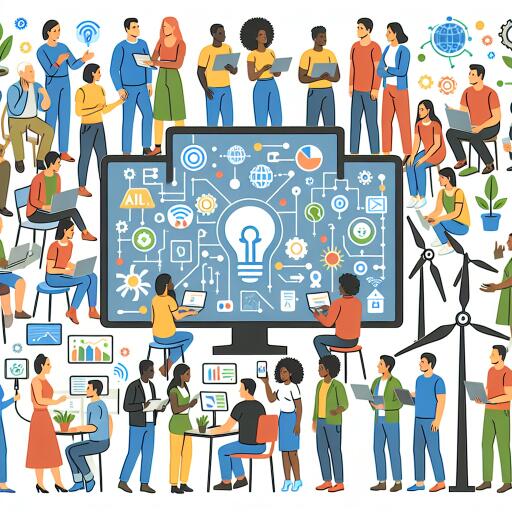
Building Trust and Inclusivity in AI-Driven Climate Action
Climate change presents a grave threat to Asia, the world’s most populous and disaster-prone region. In 2023 alone, over 9 million people were impacted, and 2,000 lives were lost due to natural disasters. The repercussions of climate change are expected to exacerbate health challenges, including a rise in infectious diseases like dengue fever. In South Asia, nearly 40 million people could face internal displacement by 2050 as a consequence of climate-related impacts.
To combat these urgent issues, policymakers are increasingly turning to technology, particularly Artificial Intelligence (AI), as a potential tool to fight climate change. Combined with traditional scientific methods, AI offers the potential for more precise climate predictions. For instance, Google’s NeuralGCM represents a pioneering effort using machine learning to enhance weather forecasting by mixing atmospheric physics with AI insights.
In agriculture, AI plays a crucial role in tackling decreasing crop yields and threats to food security induced by extreme weather. Innovative projects like AEGIS are examining ancient environmental DNA to understand and enhance crop resilience to climate changes. On a global scale, initiatives like the United Nations Climate Technology Centre and Network (CTCN) acknowledge AI’s capacity to demystify intricate systems, deliver accurate forecasts, and bolster climate adaptability.
Despite the potential, the integration of AI in climate action must be grounded in the local realities and demands of those communities most affected. A top-down approach that exclusively values expert opinions over indigenous knowledge risks overshadowing centuries-old wisdom that has adeptly adapted to climate changes. Such an approach can alienate communities, especially when technological fixes require specific expertise and resources inaccessible to them.
The Necessity of Participatory Approaches
In any climate action, participatory methods are indispensable. Without inclusive consultations, projects risk displacing indigenous populations, harming traditional livelihoods, and inciting local dissent. Stories from Cambodia’s REDD+ project, Indonesia’s nickel mining operations, and the Philippines’ electric vehicle policy serve as cautionary tales highlighting these challenges.
Marginalized communities often disproportionately suffer from decisions aimed at net-zero transitions, despite having contributed the least to overall emissions. Incorporating their voices not only fosters trust but also results in fairer outcomes. Recent research underscores the importance of deliberate and slow consultative processes where concerns are identified, communicated, and evenly addressed, leading to the credibility of AI solutions in areas like agriculture.
Collaborative initiatives like India’s Commoning for Resilience (CORE) Stack showcase the power of community-driven solutions. By uniting research entities, grassroots groups, and local volunteers, this project harnesses data for sustainable resource management.
Using technology like satellite data and AI for climate initiatives requires respecting traditional knowledge and maintaining community autonomy. Adhering to CARE principles—collective benefit, authority, responsibility, and ethics—along with ensuring free, prior, and informed consent (FPIC) from indigenous groups, is vital. Though these participatory methods demand resources and time, they are crucial for aligning technological solutions with the priorities and needs of the communities.
The Role of Philanthropic Organizations
Philanthropic organizations have an imperative role in promoting participatory approaches. They can prioritize incorporating local knowledge and experiences when developing climate technology solutions. Encouraging interdisciplinary cooperation and pioneering climate financing models can accommodate diverse perspectives, ensuring holistic decision-making.
Moreover, supporting civil society groups by providing them with the necessary guidance, technical expertise, and funding is essential for empowering indigenous and local communities. These efforts enable communities to voice their needs and ambitions effectively in a broader context. Resources dedicated to localized interventions and data-driven community projects enhance communication, evaluation, and adaptation.
From the outset, it’s vital to map community impacts and engage intended stakeholders in discussions regarding AI climate solutions. Allocating resources for ongoing consultations throughout a project’s duration ensures authentic participation and engagement.
The advantages of inclusive, participatory strategies in developing AI-focused climate actions are significant. By fostering trust and securing commitment from varied stakeholders, we can realize solutions that are not only advanced technologically but are also socially just and effective in addressing climate challenges.





Leave a Reply